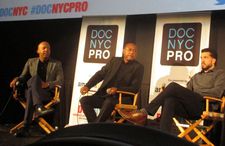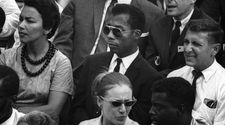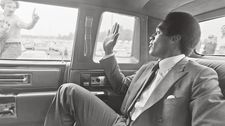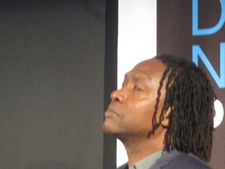_600.jpg) |
| Louise Bourgeois influenced Gianfranco Rosi, director of the Oscar and César nominated Fire At Sea |
The 89th Academy Awards' five nominees for Best Documentary Feature Film, Ava DuVernay's 13th; Roger Ross Williams's Life, Animated; Ezra Edelman's O.J.: Made In America; Raoul Peck's I Am Not Your Negro; and Gianfranco Rosi's Fire At Sea (Fuocoammare) have in common that they were screened at DOC NYC in 2016.
 |
| 13th |
The DOC NYC PRO Short List panel discussions, moderated by Thom Powers, included four of the directors and attorney Bryan Stevenson for Ava DuVernay who at the time was working on A Wrinkle In Time, adapted by Jennifer Lee from Madeleine L'Engle's novel and starring Chris Pine, Reese Witherspoon, Gugu Mbatha-Raw, Michael Peña, and Oprah Winfrey.
13th and Fire At Sea were in the Main Slate and I Am Not Your Negro in the Spotlight on Documentary program of the 54th New York Film Festival.
O.J.: Made In America was shown in its entirety at the 15th Tribeca Film Festival and the Suskind family, the subjects of Life, Animated, received a Tribeca Disruptive Innovation Award.
Here are some highlights from the panelists on the films, the election and the future of storytelling.
 |
| Bryan Stevenson, Raoul Peck and Ezra Edelman Photo: Anne-Katrin Titze |
Bryan Stevenson: I've been very frustrated because I think that we haven't done a very good job in this country in confronting the fact that we're not really free. We are still burdened by our history. We haven't taken the time to talk about the legacy of being a post-genocide society. I think that we are a post-genocide country. When white settlers came to this continent millions of native people were slaughtered. And we haven't talked about that. What we did instead is create a narrative of racial difference. And that narrative was for me the great evil of American slavery. I don't think the great evil of American slavery was involuntary servitude or forced labour. I believe it was the ideology of white supremacy that we created to legitimate slavery.
And the 13th Amendment doesn't really deal with that. It talks about involuntary servitude and forced labour but it doesn't talk about this narrative of racial difference. Because of that, I don't think slavery ended in 1865. I think it evolved. And then we have 100 years of American history where this narrative of racial difference manifests itself in brutal ways - lynching, racial terror, segregation, and now mass incarceration. And so for me it becomes important to engage in storytelling that challenges the real threat that we face. I think the North won the Civil War but the South won the narrative war. We did not demand from the South a repudiation of white supremacy.
 |
| I Am Not Your Negro |
We won an end to lynching in the 1940s and 50s, but the South won the narrative war about the legitimacy of lynching. We won the passage of the Voting Rights Act and the Civil Rights Act in 1965 but the South won the narrative war about the legitimacy of resisting racial equality. And today there is a presumption of dangerousness and guilt that gets assigned to black and brown people that is now manifest in this record-level of incarceration and stop-and-frisk and police violence. And because we hadn't talked about this narrative, we haven't acknowledged that we've never really made progress. This week we've seen the election of someone who has comfortably used that narrative of racial difference to gain power.
Raoul Peck: I've been working on this film for at least ten years, not counting the 20 years prior since I discovered James Baldwin's books. And by the way, all that you say is precise and exact and Baldwin has been one of the few people who have seen through that false and flawed history. That the history didn't start with slavery. It started with a massacre. And this massacre had been totally pushed under the carpet. We are living with a totally different history and a totally false history.
 |
| O.J.: Made In America |
When we are talking about a free country - I'm sorry, but the first free country of the Americas is Haiti [where Peck was born and briefly served as Minister of Culture]. Haiti is the first territory where slaves fought against the armies of Napoleon, of the British, of the Spanish armies and they created a nation. A nation where soldiers of that nation 60% of them were born in Africa. And they created a free nation. The first constitution, 1804, stated that any fugitive who set foot on Haiti is a Haitian and a free man or a free woman. This revolution had been totally erased. The United States took 65 years to recognise Haiti as an independent country.
This election, I'm not afraid of whatever happens, because for us the fight will just continue and we have no choice. Through our anger we learn how to organise. There have been many movements - Civil Rights Movement, Black Panther, Black Muslim, all these organizations, today Black Lives Matter - we have found intelligent ways to fight that system and that void of history and it will continue.
Ezra Edelman: In relation to all the issues that Bryan and Raoul talked about, when you looked at what the story [of O.J. Simpson] became in '94, '95 it was clear that it had very clear roots and antecedents in this place and time that O.J. came to be in this sort of toxic mix of his quest for celebrity and his quest to be de-racialised in many ways in terms of how he wanted the world to see him versus what was going on next door to him as he was becoming this football hero, this American celebrity. Those were the things that got me engaged with telling his story and understanding that there was a much bigger American narrative to be told beyond - "did he do it?"
 |
| Roger Ross Williams Photo: Anne-Katrin Titze |
From a starting off standpoint, sport being a great equaliser, also was this thing that, I think, allowed O.J. to delude himself as far as the path he ended up taking. And where we got to, with him as a cultural figure, speaks to how we treat our sports heroes. The sense of entitlement that set in, the sense of feeling that he was universally loved and appreciated by everyone equally. That's where fundamentally sports plays a profound role in this. I think that the idea that he also came of age when he did, at a time when there was a movement of black athletes preceding him that did understand the country they were living in and did try to use their platform to speak out and to evoke some sort of change.
And that OJ because of already his being susceptible to the light over here, the money, the fame, what could be on the other side - he was allowed to be willingly seduced into this other path. The damage that he caused is that he was a pioneer in creating a genre, sort of a group of people who went off to that same place and said - it's okay not to be political, it's okay not to be outspoken, it's okay to have these false gods of money and fame. That's a sort of cautionary tale.
Roger Ross Williams: What Owen [Suskind] did was, he sort of wrote an autobiography of his life. It's the story of a kid who gets lost in the land of the lost sidekicks because he identifies with the sidekicks in Disney animated films and not the heroes. The sidekicks were lost in this land because the heroes had fulfilled their destiny. Now they had to battle and find their own inner hero. I always wanted to bring that part of the story, Owen's inner world, to life.
_225.jpg) |
| Life, Animated |
When you work with animators, the way they work is very different than documentaries because the story is constantly changing, constantly evolving and they don't like that. I worked with an incredible group of French animators and a company called Mac Guff [Ligne] in Paris.
It was about slowly bringing the audience into Owen's world. And in the end you are questioning whether you're the one who is sort of trapped or Owen. Because Owen is free. Owen lives in this rich, beautiful world. He doesn't have a wall between him and other people. It's about a young man coming of age and the stakes are higher for him because he has autism but he hits all the themes everyone goes through.
Gianfranco Rosi: Before I start a film I have to spend a lot of time in the place meeting people and then I have to be able to absorb that element, that moment. Years ago, I studied in New York, I was an NYU student and I had the privilege of meeting Louise Bourgeois, the sculptress. She was already old and I went to her studio. She invited me there. I spent a whole afternoon there looking at her work and her things. At a certain point, there was a huge table, like this stage, and she had so many things, like all her memories were alive on this table. There were just places of memorabilia there.
_225.jpg) |
| Fire At Sea |
At a certain point she is saying "I want to show you how my work started." And there was a piece of clay there. She put it in my hand. She'd say: "All my work started from this piece of clay. I didn't know what it was going to be. I wanted it to be a sculpture. I didn't know what was going to be the shape of my work. So I spent days, weeks, months holding this piece of clay in my hand. And once I had an image, very, very strong and I left that piece of clay - and all my work is there in that moment." So this is what is important - to find a piece of clay within us.
I didn't know where it's going to be, this film but that has to be a starting point for me, that little truth that I have inside, that we have inside, I think everybody. From there starts this journey.
The Césars will be awarded on February 24, 2016.
The Academy of Motion Picture Arts and Sciences celebration takes place on February 26, 2017.





















